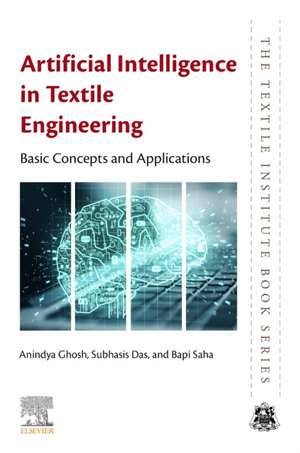Artificial Intelligence in Textile Engineering: Basic Concepts and Applications: The Textile Institute Book Series
Autor Anindya Ghosh, Subhasis Das, Bapi Sahaen Limba Engleză Paperback – 6 iun 2024
- Includes MATLAB® codes for solving various artificial intelligence techniques
- Provides case studies, practical examples of textile engineering problems and self-study problems in each chapter
- Presents step-by-step mathematical derivations of artificial intelligence techniques throughout
Din seria The Textile Institute Book Series
- 24%
 Preț: 958.65 lei
Preț: 958.65 lei - 39%
 Preț: 953.82 lei
Preț: 953.82 lei - 9%
 Preț: 988.33 lei
Preț: 988.33 lei - 29%
 Preț: 1481.04 lei
Preț: 1481.04 lei - 29%
 Preț: 983.40 lei
Preț: 983.40 lei - 29%
 Preț: 1132.44 lei
Preț: 1132.44 lei - 24%
 Preț: 1305.12 lei
Preț: 1305.12 lei - 23%
 Preț: 1166.95 lei
Preț: 1166.95 lei - 24%
 Preț: 1898.12 lei
Preț: 1898.12 lei - 24%
 Preț: 1309.25 lei
Preț: 1309.25 lei - 39%
 Preț: 1308.23 lei
Preț: 1308.23 lei - 29%
 Preț: 1069.05 lei
Preț: 1069.05 lei - 24%
 Preț: 1069.73 lei
Preț: 1069.73 lei - 9%
 Preț: 1138.48 lei
Preț: 1138.48 lei - 24%
 Preț: 1076.64 lei
Preț: 1076.64 lei - 9%
 Preț: 956.77 lei
Preț: 956.77 lei - 29%
 Preț: 1328.39 lei
Preț: 1328.39 lei - 24%
 Preț: 1389.27 lei
Preț: 1389.27 lei - 9%
 Preț: 1164.37 lei
Preț: 1164.37 lei - 39%
 Preț: 1276.14 lei
Preț: 1276.14 lei - 29%
 Preț: 1328.73 lei
Preț: 1328.73 lei - 29%
 Preț: 1070.42 lei
Preț: 1070.42 lei - 24%
 Preț: 1221.45 lei
Preț: 1221.45 lei - 24%
 Preț: 956.16 lei
Preț: 956.16 lei - 24%
 Preț: 848.70 lei
Preț: 848.70 lei - 29%
 Preț: 895.08 lei
Preț: 895.08 lei - 29%
 Preț: 1128.06 lei
Preț: 1128.06 lei - 24%
 Preț: 885.39 lei
Preț: 885.39 lei - 23%
 Preț: 938.57 lei
Preț: 938.57 lei - 24%
 Preț: 1009.79 lei
Preț: 1009.79 lei - 29%
 Preț: 1125.63 lei
Preț: 1125.63 lei - 39%
 Preț: 1135.65 lei
Preț: 1135.65 lei - 24%
 Preț: 928.64 lei
Preț: 928.64 lei - 39%
 Preț: 1535.55 lei
Preț: 1535.55 lei - 29%
 Preț: 1128.81 lei
Preț: 1128.81 lei - 24%
 Preț: 1010.39 lei
Preț: 1010.39 lei - 23%
 Preț: 1081.75 lei
Preț: 1081.75 lei - 24%
 Preț: 797.86 lei
Preț: 797.86 lei - 9%
 Preț: 956.24 lei
Preț: 956.24 lei - 24%
 Preț: 953.65 lei
Preț: 953.65 lei - 24%
 Preț: 1307.18 lei
Preț: 1307.18 lei - 24%
 Preț: 988.25 lei
Preț: 988.25 lei - 24%
 Preț: 1329.69 lei
Preț: 1329.69 lei - 29%
 Preț: 1308.38 lei
Preț: 1308.38 lei - 29%
 Preț: 1388.76 lei
Preț: 1388.76 lei - 24%
 Preț: 1016.87 lei
Preț: 1016.87 lei - 29%
 Preț: 798.54 lei
Preț: 798.54 lei
Preț: 909.17 lei
Preț vechi: 999.10 lei
-9% Nou
Puncte Express: 1364
Preț estimativ în valută:
174.02€ • 189.09$ • 146.28£
174.02€ • 189.09$ • 146.28£
Carte tipărită la comandă
Livrare economică 14-28 aprilie
Preluare comenzi: 021 569.72.76
Specificații
ISBN-13: 9780443153952
ISBN-10: 0443153957
Pagini: 310
Dimensiuni: 152 x 229 mm
Editura: ELSEVIER SCIENCE
Seria The Textile Institute Book Series
ISBN-10: 0443153957
Pagini: 310
Dimensiuni: 152 x 229 mm
Editura: ELSEVIER SCIENCE
Seria The Textile Institute Book Series
Cuprins
1. Introduction to AI Techniques
2. Basic Concepts of Artificial Neural Network and Applications in Textiles
3. Use of the Support Vector Machine in Textiles
4. Applications of Fuzzy Inference Systems in Textiles
5. Applications of Rough Set in Textiles
6. Applications of Nature-Inspired Optimisation Algorithms in Textiles
7. Applications of Hybrid Intelligence Systems in Textiles
2. Basic Concepts of Artificial Neural Network and Applications in Textiles
3. Use of the Support Vector Machine in Textiles
4. Applications of Fuzzy Inference Systems in Textiles
5. Applications of Rough Set in Textiles
6. Applications of Nature-Inspired Optimisation Algorithms in Textiles
7. Applications of Hybrid Intelligence Systems in Textiles
